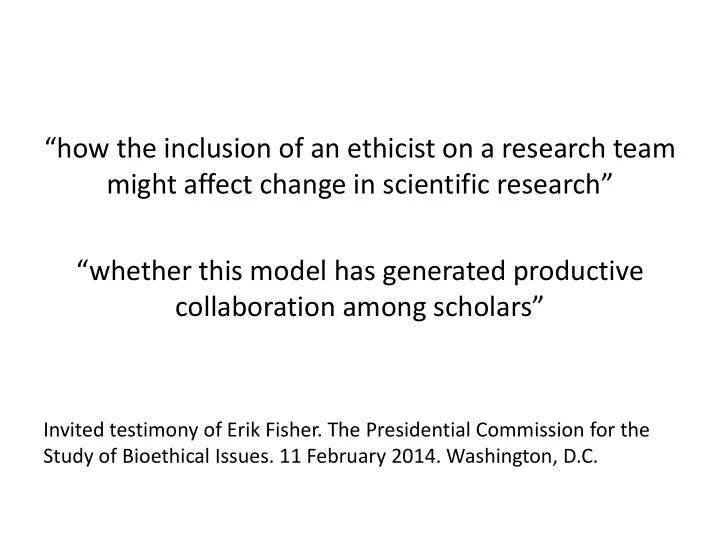

“ how the inclusion of an ethicist on a research team might affect change in scientific research” “ whether this model has generated productive collaboration among scholars” Invited testimony of Erik Fisher. The Presidential Commission for the Study of Bioethical Issues. 11 February 2014. Washington, D.C.
Socio-Technical Integration Research (STIR) • Coordinated series of 20 (+10) studies to assess the possibility and utility of socio-technical integration – The process by which researchers account for the societal aspects of their work as an integral part of this work • 12 week structured interactions between embedded humanists and their laboratory hosts • NSF has identified STIR as “ a model for future integration of ethicists and social scientists into nanotechnology R&D laboratories.” (FY2014 Budget Req. to Congress; Guston, 2013)
Framework for Midstream Modulation De facto modulation Scientific research is conditioned by socio-ethical dimensions Reflexive modulation Scientific researchers recognize de facto modulation as such Deliberate modulation Reflexive modulation becomes a productive resource for scientific research (Fisher et al., 2006)
Decision Protocol OPPORTUNITY Articulate the problem and its framing Expand the perception of relevant values and concerns What are you working on? CONSIDERATIONS Expand the perception of Identify and expand criteria and values available choices Why are you working on it? ALTERNATIVES Identify and expand options for responding How could you do it differently? OUTCOMES Anticipate effects over time and their meanings Who might care what you do and why you do it? (Fisher, 2007)
The Beginning of Inquiry t 1 “We don’t make decisions” t 2 “I guess this really is a decision”
Mechanical Engineering Case • Environmental, health and safety concerns surface • Alterations made to experimental set-up, materials and procedure • Dead project is revived • Residual effects: 18 months after study’s end, a successful dissertation; protocol still being used (Fisher, 2007)
Biotechnology Case • Researchers recognize tensions in their philosophical views on the role of science in society • Residual effects: one week after study’s end, lab group debates and collectively alters their safety practices (Schuurbiers, 2011)
Genetics Case • Political scientist becomes adept at experimentation • Helps researcher in another lab improve results • Lab initiates patient engagement outreach • Residual effects: Invitations to co-author papers and co-lead workshops on the ethics of genetic research (Conley, 2011)
Environmental Engineering Case • Nano-waste dilemma • “What do I care what the public thinks?” • Lab meeting cannot resolve the issue • Residual effects: Collaborators author an op-ed calling for public policy guidance
Industrial Biotechnology Case • Pre-test – 1 of 5 participants state that integration is “part of the job” • Post-test – 5 of 5 participants state that integration is “part of the job” (Flipse et al., 2012)
Preliminary Survey Results Reflexive Modulation Deliberate Modulation (Learning) (Behavior) Protocol 18/18 17/18 No Protocol 2/2 0/2 Results of 20/30 expected individual studies. KEY: Protocol : STIR protocol was consistently used in an in-depth and collaborative manner (18 studies). No Protocol : Protocol was not used, or was used to elicit information but not to feed it back to the field (2 studies).
Public Policy Value • Ethical capacity – Virtue ethics and “prudent vigilance” • Tacit (vs. formal) education • Responsible and effective communication • Material adjustments – Social shaping of emerging technology • Scientific productivity • Can flag issues – For more extensive analysis by ethical experts, policy makers, or the public
Conditions for Effective Integration • Embedded in the science – Regular, situated, focused on actual decisions • Evolve over time – Allow initial misalignments to surface and transform – Temporary status of humanist encourages learning • Avoid instituting permanent micro-scale silos • Voluntary • Framed as inquiry – Collaboration vs. compliance – Capacities vs. expertise – Avoid trap of promising benefits
STIR is supported by the National Science Foundation under #0849101. Any opinions, findings and conclusions are those of the author and do not necessarily reflect the views of the National Science Foundation. For full bibliographic citations, contact efisher1@asu.edu.
Recommend
More recommend